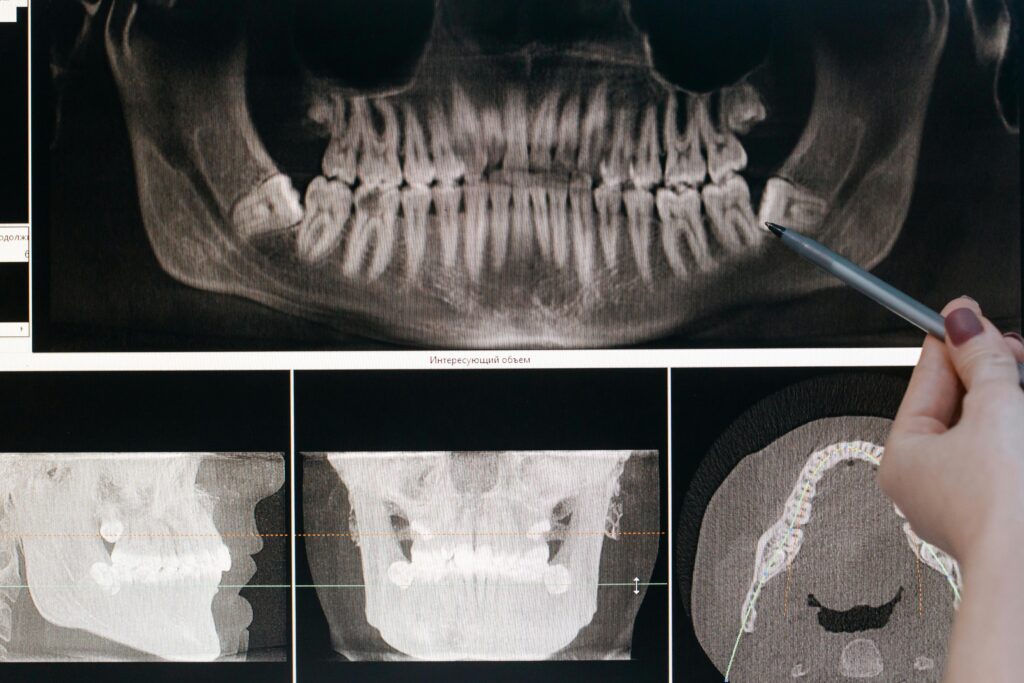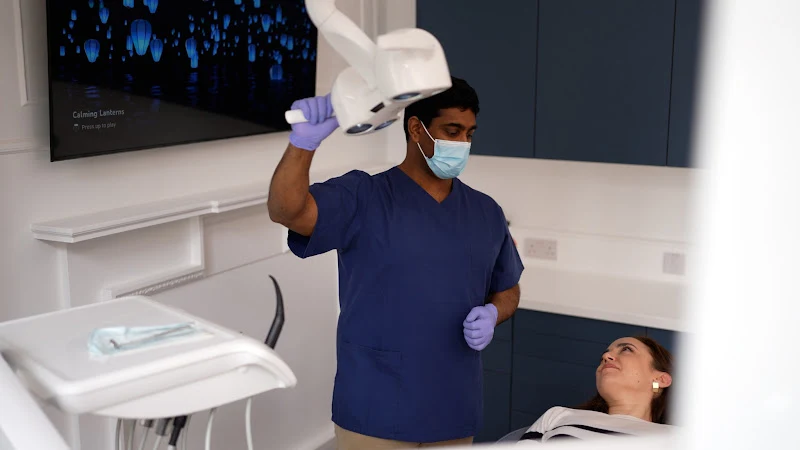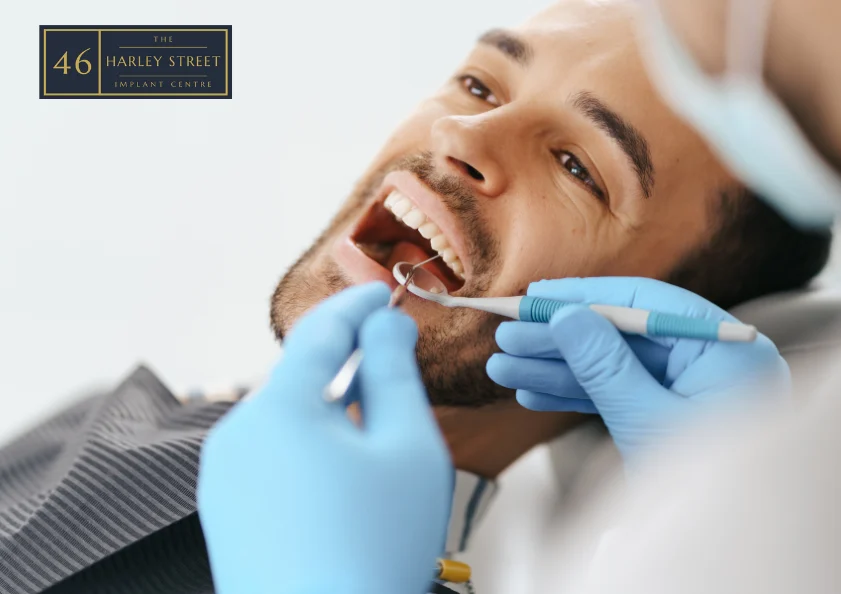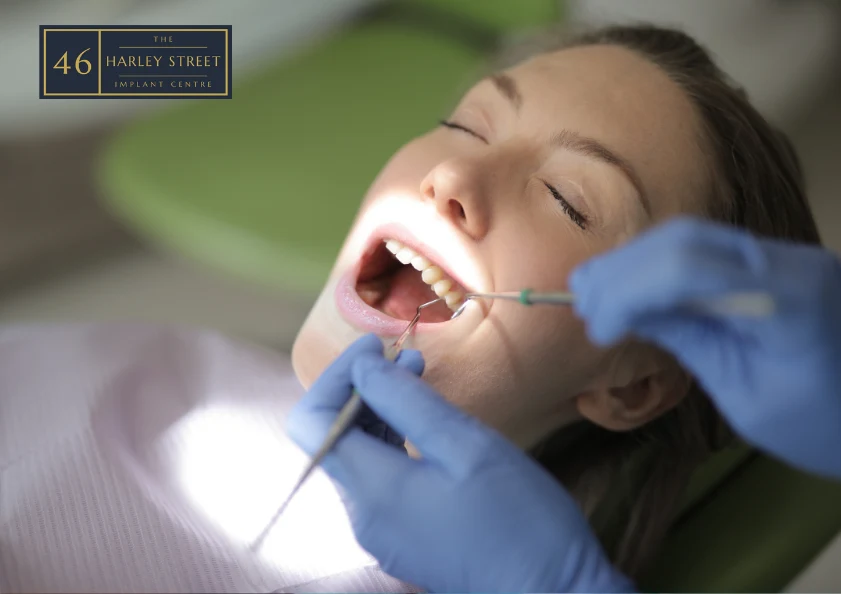One year ago, I opened the doors to Harley Street Implant Centre, a private dental implant and sedation clinic designed to serve …
Impacted Wisdom Tooth: Causes, Symptoms, and Treatment Options in London
Your wisdom teeth develop during late adolescence and early adulthood. They are teeth found at the back of our mouth. Due to their position in the mouth, and the lack of space surrounding them, wisdom teeth are often problematic and can lead to various dental issues that require treatment.
Importantly, while everyone has four wisdom teeth, they don’t always break through (erupt) the gums and grow. Indeed, about 80% of adolescents retain at least 1 wisdom tooth inside the jaw.

What is an impacted wisdom tooth?
Occasionally, wisdom teeth will not cause any issues. However, if there is not enough space in the mouth for the wisdom tooth to develop and erupt normally, some people may develop pain and inflammation of the gums. This is known as wisdom tooth impaction and essentially means the tooth is trapped in the jawbone.
Some studies have shown that nearly ¾ of individuals in their 20-30s may experience symptoms of an impacted wisdom tooth. Indeed, it has been suggested that the incidence of wisdom tooth impaction is increasing in light of a softer diet than our ancestors, which has led to the human jaw reducing in size. This reduces the space for our wisdom teeth to grow and develop normally.
Common symptoms of an impacted wisdom tooth
Pain and swelling: Pain is often the most noticeable and most significant symptoms of wisdom tooth impaction. This pain can vary in intensity. Often it is a continuous pain that is dull and throbbing that worsens with eating, smiling and chatting. Whilst the pain is often localised to the area of wisdom tooth impaction, it can also radiate to the jaw, cheeks or ears in light of the distribution of nerves in this area.
Inflammation (Pericoronitis): When your wisdom tooth is trying to push into a space that is too small, it can cause irritation and inflammation to your gums. This natural response can lead to redness and swelling.
Infection: When there is a partially erupted wisdom tooth, a small area of gum tissue can create a flap known as an operculum, that covers the biting surface of the tooth. Some food can get trapped within this flap, which creates an environment for bacteria to flourish and multiple, leading to infection. This can present locally with pain, inflammation and pus, or it can spread into your blood which can cause more systemic symptoms such as fevers and fatigue.
Jaw stiffness: Swelling, inflammation and pain can make your jaw difficult to move. This can cause difficulties with chewing and speaking.
Headaches: Due to the distribution of the nerves within the face, pain radiating from the jaw can spread to your temples. This can present very similar to a headache.
Crowding or alignment issues: An impacted wisdom tooth can put lots of pressure on surrounding teeth. This can lead to misalignment and crowding, that may need orthodontic input.
Bad breath: wisdom tooth impaction can lead to food or bacteria being trapped at the back of your mouth under the operculum. This can cause problems with bad breath.
How are impacted wisdom teeth diagnosed?
If you suspect you have an impacted wisdom tooth, it is important to visit your dentist.
Impacted wisdom teeth should be diagnosed by your dentist with a formal assessment +/- an X-ray to help visualise the position of the wisdom tooth.
How are impacted wisdom teeth treated?
For a complete look at the different treatments available for impacted wisdom teeth, please read our blog by Dr. James that outlines both surgical and non-surgical approaches.
- Pain management
Pain can be a significant symptom of an impacted wisdom tooth. Your dentist may recommend simple analgesics to help with this, including paracetamol and ibuprofen. Salt water rinses can also help with pain relief.
- Antibiotics
If the impacted wisdom tooth is infected, your dentist may provide some antibiotics to help control the infection and prevent it from spreading.
- Tooth extraction
There are two main forms of wisdom tooth extraction; surgical and non-surgical extraction. If the wisdom tooth is impacted, this requires a surgical extraction. This involves making a small incision in the gum and removing the tooth, usually using local anaesthesia +/- sedation.
How to prevent impacted wisdom teeth from developing?
It may not be possible to prevent impacted wisdom teeth from developing but we can help prevent their complications and catch them early by regular monitoring with your dentist.
If you do develop an impacted wisdom tooth, good oral hygiene practices such as brushing and flossing regularly and using warm salt water washes, can prevent the development of complications such as infection.
How can we help?
At The Harley Street Implant Centre, Dr James is a Specialty Doctor in Oral and Maxillofacial surgery, with extensive experience in surgical extractions of wisdom teeth. If you are worried you have an impacted wisdom tooth and are hoping for a surgical extraction, contact us now to arrange an appointment.
What is the cost of Dental Implants in London? When exploring tooth replacement options, one of the most common questions patients ask …
When preparing for a dental implant procedure, one of the most common questions patients ask is how dental implant anaesthetic works and …
Clear Teeth Aligners
Clear Teeth Aligners in London Clear teeth aligners have become a popular alternative to traditional braces, with the leading brand Invisalign standing …



